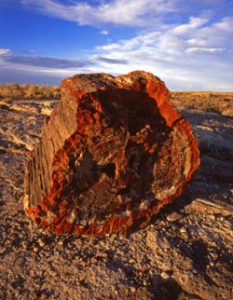
Lesson Extension 3
Suggested Science Explorations
 If you or your students find that you are stumped for exciting science topics, browse through this Energy Underground section for some different ideas.
If you or your students find that you are stumped for exciting science topics, browse through this Energy Underground section for some different ideas.
Good science projects start out with interesting questions. Perhaps some of these topics will prove challenging.
• Can one duplicate the process by which animal and plant remains become fossils?
• Will equal amounts of materials shaken in two equally-shaped jars, one filled with salt water, one fresh, settle and layer in exactly the same order? Why or why not? (suggested materials: small rocks, soil, sand, gravel, etc.)
• What conditions can cause water or oil to move up through the soil? (suggested materials: large aquarium, balloon buried under various materials, plastic straws)
• What qualities of gases make them “lighter” than air?
• Where do different gases come from? Where does helium come from? What are some uses for helium? Can you produce hydrogen in your kitchen?
• Why are gases colorless? How can color be added to a gas?
• Illustrate the process of getting natural gas – underground to pipeline to consumer.
• With different art media – illustrate the different types of energy resources available in your area. Compare/graph energy prices.
• Draw/construct a map showing major fossil fuel deposits in the United States.
• Illustrate the differences between natural gas and gasoline.
• Illustrate different materials made from or with natural gas and its by-products.
• How do seismographs work and how are they used to find natural gas?
• What are different careers in the natural gas industry?
• Illustrate the accepted scientific theory of how natural gas and other fossil fuels were formed.
• What is methane? How is it formed? Why is it also called a “greenhouse gas”?
• What is a sandstone lense? Can you reconstruct one in an aquarium?
• What natural processes made sandstone? Limestone?
• Display a collection of common rocks in your area.
• Why are petroleum deposits and natural gas often found in similar locations?
• What are phase transitions and how do they relate to the study of different gases?
• What conditions can cause a piece of wood to become petrified rather than causing it to decompose?
• As natural gas is removed from a sandstone lense, what, if anything, is put in its place to keep it from collapsing?
• Construct a display of the residue left by burning each of the three fossil fuels (particulates, smoke or nothing).
• What factors increase a gas’s flammability?
• Trace the history of use of natural gas, from the ancient Chinese to modern day.
